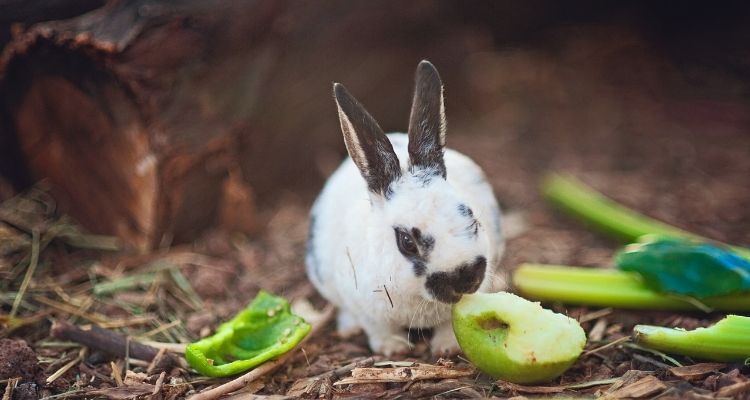If you have vegetable scraps, peelings or wilted greens you may be tempted to feed these to your rabbit. Before you do, check our list below on what food can rabbits eat and what they should avoid to keep your bunny in optimal health.
The typical diet plan for a domesticated pet rabbit consists of water, hay, pellets, fresh veggies, and its own caecal pellets. Fruit and other treats can be given in very restricted amounts. Bunnies need a consistent supply of water as they dehydrate quickly.
Many sources advise at least 80% of the foods rabbits can eat should be Timothy hay or another grass based hay. Too many veggies in a bunny’s eating regime generally leads to diarrhea and other digestion problems.
What Hay Should Rabbits Eat?
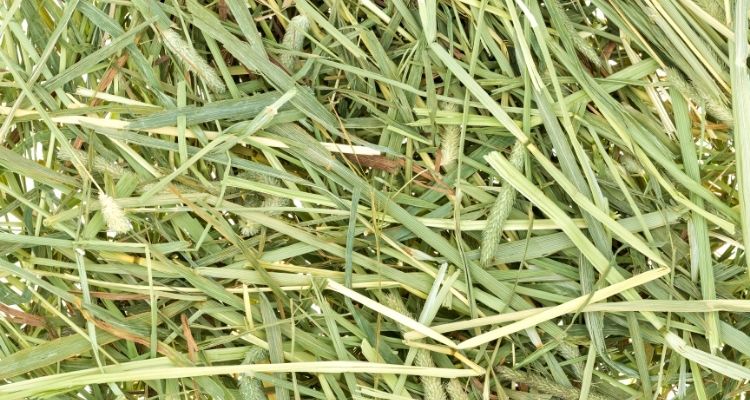
Hay is vital for the health of all rabbits. A consistent supply of hay will help prevent gastrointestinal stasis and other digestion tract problems in rabbits. Additionally, hay provides a number of necessary minerals and vitamins that our precious bunnies need.
Bunnies take pleasure in chewing on hay, and always having hay readily available for the bunny may decrease its propensity to chew on other items.
Timothy hay, oat hay, brome and orchard grass are considered the healthiest to supply the rabbit. You can supply these individually or as a mixture of hay.
Alfalfa hay is really a legume, not grass. It is fairly high in food energy, and a constant diet of it can trigger weight problems in rabbits. This is why we only feed alfalfa hay to baby bunnies (up to 7 months old).
If you are looking for an occasional treat for your bunny, alfalfa hay is okay, but should not be fed to mature rabbits on a daily basis.
What Pellets Should Rabbits Eat?
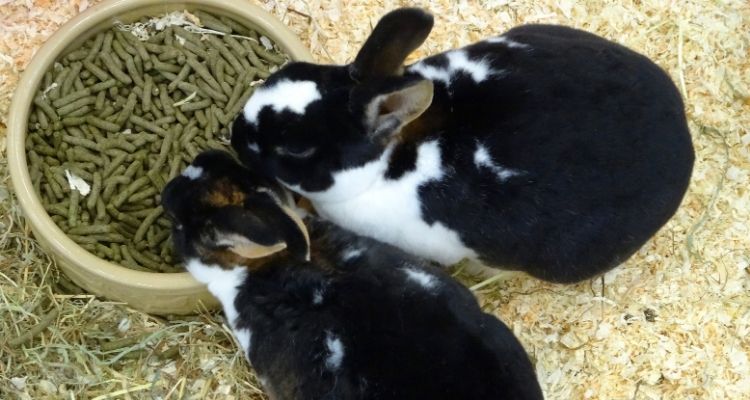
Bunnies are usually fed a pelleted feed readily available from from your local pet store. Did you know that pellets were initially developed for bunny breeders for the purpose of offering as much food energy and vitamins as cheaply as possible?
Pellets can supplement a rabbits diet, but should not be the main source of food. Ensure you look at the ingredients of the pellets you are choosing. Avoid pellets that have corn, seeds and added nuts. These ingredients can be harmful for your bunny.
The higher the fiber content of the pellets the better. Do not allow an endless supply of pellets, an adult rabbit that weighs 6 to 10 pounds needs just one quarter of a cup of pellets daily.
Adolescent and pre-adolescent rabbits (up to the age of 7 months old) can be offered as much pelleted diet plan as they can consume, although additional veggies are preferable to additional pellets.
An older rabbit (over 6 years) can be provided more pellets if they are having problem maintaining a stable body weight.
Timothy hay-based pellets are great for bunnies that have stopped growing and do not require to put on weight.
Alfalfa-based pellets are best only for young, growing rabbits or older bunnies who are under-weight.
What Food Can Baby Rabbits Eat
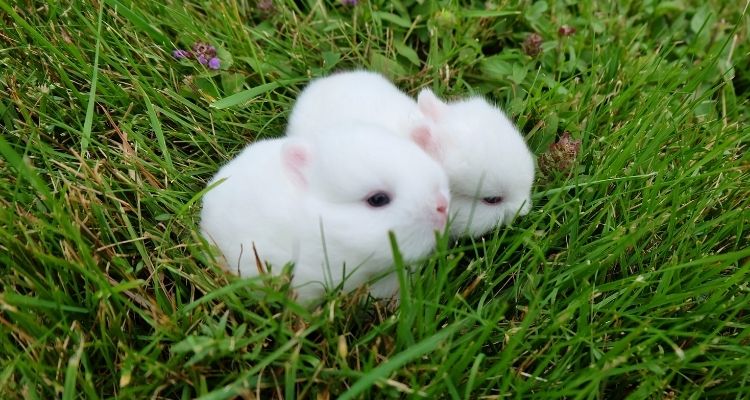
As mentioned above, alfalfa hay is the best hay to feed young bunnies and baby rabbits up to the age of 7 months. After this time, introduce Timothy hay or other grass hays.
Do not feed fresh fruit to baby rabbits until they are at least 4 months old. After this time, their gastrointestinal systems are mature enough to digest fruits.
Alfalfa pellets can also be offered to baby bunnies. If you are feeding alfalfa pellets, choose a different hay.
What Vegetables and Fruit Can Rabbits Eat?
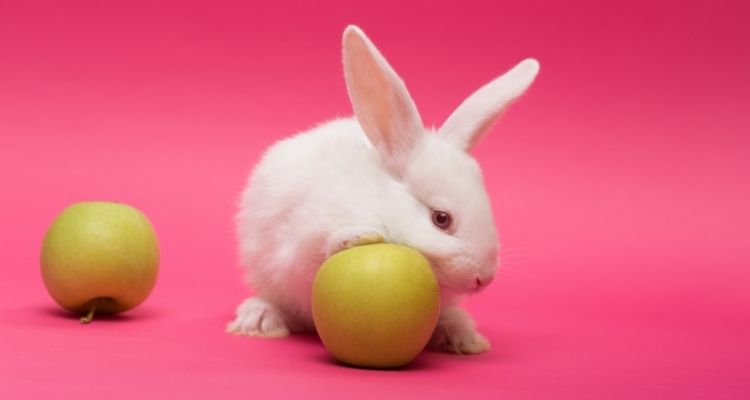
Vegetables can be fed to rabbits daily, preferably fresh green vegetables, excluding beans and rhubarb.
Choices such as zucchini, brussels sprouts, bok choy, romaine lettuce, endive and herbs such as basil, rosemary and cilantro can be fed daily.
Vegetables such as carrots, chard, spinach, kale and broccoli should be fed once or twice a week. If you are feeding broccoli to your bunny, only give them the leaves and stems, not the florets.
An adult bunny should consume 1 to 2 cups of fresh vegetables per day, depending on their size. Naturally, the smaller the rabbit, the smaller the portion.
Fruit should be fed one to two times a week as a treat, not a daily occurrence.
Acceptable fruits are Banana, Pineapple, Watermelon, Peach, Apple, Kiwi, Berries, Orange and other citrus fruits. Seeds should be removed. Introduce a new fruit slowly and sparingly, remember, rabbits have a sensitive digestive system.
Keep the serving size of fruits to one to two tablespoons only.
While a typical myth that rabbits need to be offered lettuce, this is not an excellent concept since it consists of little to no dietary value for the bunny. Dark green lettuces can be fed, but iceberg lettuce should be avoided.
Store Bought Treats for Rabbits
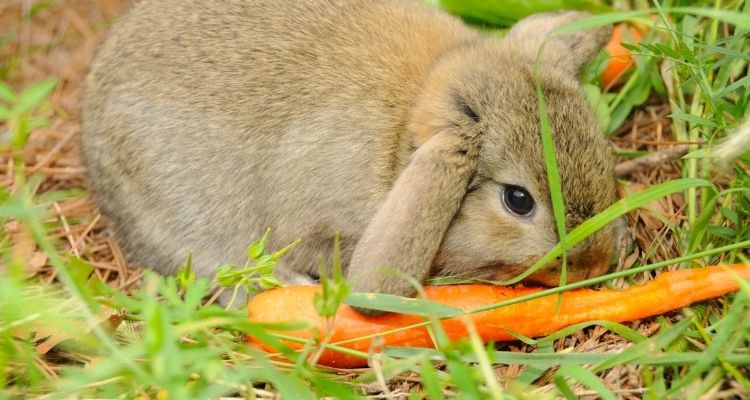
You can purchase natural mixes from pet food stores that include dried flowers such as chamomile, marigold, rose, pansy and english daisies to name a few.
Check for added sugars – avoid purchasing if there are additional sugars in the treats. Likewise for artificial coloring sand preservatives.
Cecal pellets
If you see your bunny eat some of his poop, do not be alarmed. These are called cecal pellets or cecotrophes, and are a vital part of his diet. They are different to the smaller dry hard rabbit poop you would normally find.
Cecal pellets are soft, clumpy feces, and are a rabbit’s only supply of Vitamin B12. Due to the design of the rabbit’s digestive system, they can not draw out some minerals and vitamins straight from their food.
At the end of their gastrointestinal system is an area called the cecum where cellulose and other plant fibers are broken down and ferment.
After they have actually been broken down and passed, a rabbit’s digestive system can finally extract the vitamins from them.
What Not to Feed Your Rabbit or Baby Bunny
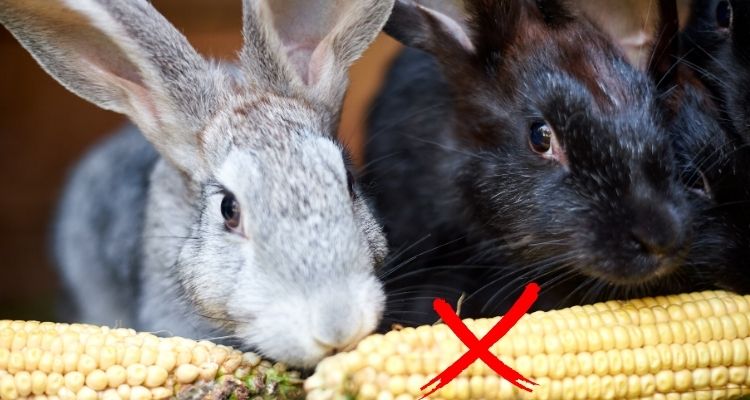
The following foods should not be given to your rabbit all:
Vegetables Rabbits Cannot Eat
- Beans
- Corn
- Peas
- Avocado
- Cauliflower
- Cabbage
- Iceberg Lettuce
- Rhubarb
- Potatoes and their leaves
- Mustard Greens
- Turnip Greens
- Beet Greens
Carbohydrates Rabbits Cannot Eat
- Legumes
- Pasta
- Crackers
- Cereals
Can Rabbits Have Dairy?
Rabbits should not be fed any dairy products due to high sugar levels. Dairy can lead to tooth decay in rabbits and weight gain.
Can Rabbits Eat Nuts?
Whilst nuts are not toxic to rabbits, they can lead to diarrhea, digestive problems and illness in your rabbit.
What Commercial Human Foods Should Rabbits Not Eat?
Want to share your chocolate, cookies or cake with your rabbit? Don’t. It is for their own good.
Foods high in sugar can cause Enterotoxemia in rabbits, an overgrowth of bacteria in the cecum which release a toxin fatal to rabbits.
Remember, fresh hay and fresh water will keep your bunny happy and healthy. Don’t be tempted to treat your bunny too often, the health problems, vet bills and shortened lifespan of your rabbit aren’t worth it.

